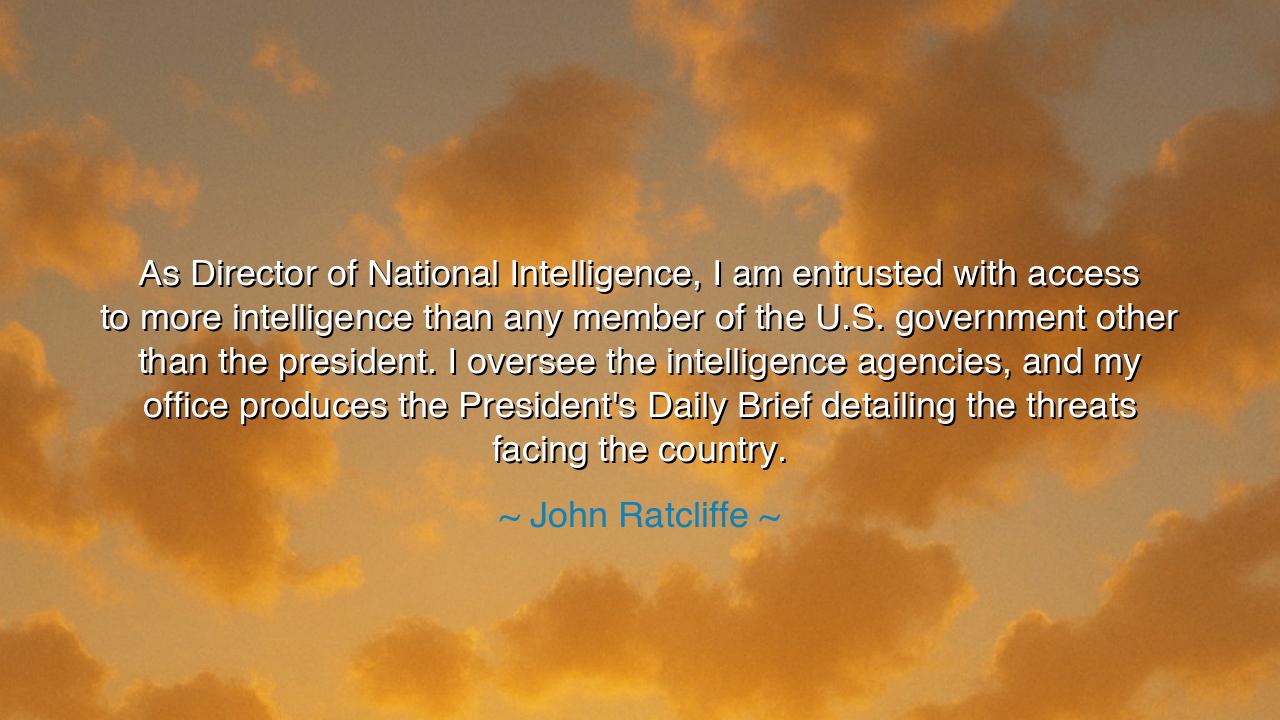
As Director of National Intelligence, I am entrusted with access
As Director of National Intelligence, I am entrusted with access to more intelligence than any member of the U.S. government other than the president. I oversee the intelligence agencies, and my office produces the President's Daily Brief detailing the threats facing the country.






In the solemn halls of power, where secrets are weighed like gold and the safety of nations hangs upon the edge of knowledge, John Ratcliffe, once Director of National Intelligence, spoke words that capture both the burden and the sanctity of his office: “As Director of National Intelligence, I am entrusted with access to more intelligence than any member of the U.S. government other than the president. I oversee the intelligence agencies, and my office produces the President’s Daily Brief detailing the threats facing the country.” These words, though spoken plainly, resound like an oath—an acknowledgment of the immense trust placed in one who must see what others cannot, guard what others must not know, and act in silence for the good of all.
To be entrusted with knowledge is no small thing. For knowledge, in its purest form, is both power and peril. The ancients taught that wisdom is a double-edged sword—one that can defend the innocent or destroy them if wielded without conscience. Ratcliffe’s words remind us that the Director of National Intelligence is not merely a collector of information, but the guardian of truth itself—the unseen shield of the republic. In a world where threats multiply in shadow, where deceit travels faster than light, this role stands as one of the most sacred in modern governance. For the preservation of a nation depends not only upon armies or laws, but upon the vigilance of those who dwell in the realm of secrecy.
The President’s Daily Brief, spoken of by Ratcliffe, is more than a document—it is the heartbeat of awareness within the government. Each morning, as the leader of the free world sits to read it, the weight of the unseen becomes known: plots woven in foreign lands, whispers of war, movements of enemies, and the subtle tremors of change that foretell tomorrow’s storms. In this sacred exchange between intelligence and leadership lies the very essence of civilization’s defense—the meeting of knowledge and judgment. And it is the duty of the Director of National Intelligence to ensure that this knowledge is pure, unswayed by pride, and sharpened by truth.
History offers many mirrors to this trust. Consider the story of Sir Francis Walsingham, spymaster to Queen Elizabeth I of England. It was he who uncovered the Babington Plot, saving his queen from assassination and the realm from chaos. Walsingham worked in shadows, surrounded by deception, yet his loyalty never wavered. His duty was not to glory, but to truth—to ensure that his monarch saw the world as it was, not as she wished it to be. So it is with the modern Director of National Intelligence. Like Walsingham, Ratcliffe and those before him bore the burden of unseen warfare—defending the homeland not with swords, but with the knowledge that can prevent their use.
And yet, there is a deeper wisdom in his words: that power without restraint becomes destruction, and secrecy without integrity becomes tyranny. The ancients said, “He who knows all must also master himself.” To hold the world’s secrets is to stand always upon the edge of corruption, for the temptation to shape truth, rather than reveal it, is great. But the noble servant resists. He remembers that intelligence exists not to serve pride, but to protect the people—to illuminate danger, not to manipulate destiny. Ratcliffe’s statement carries the weight of that humility: he speaks not to boast of what he commands, but to affirm the sacred responsibility that comes with command.
Indeed, his declaration is not merely about power—it is about trust. For the intelligence community functions only as well as the trust that binds it. Each operative, each analyst, each diplomat works in faith that their efforts will be guided by leaders of integrity. And the leader, in turn, must remember that his access to knowledge does not make him master of men, but steward of their safety. The ancients might have called such a figure a guardian of the gates, one who keeps watch when others sleep, and who, though unseen, ensures that the dawn may rise untroubled.
So let this lesson endure: knowledge demands virtue. Whether you lead a nation or a household, whether you command armies or ideas, remember that to know is to bear a duty—to speak truth even when it is unwelcome, to act rightly even when no one watches, to guard secrets not for power’s sake, but for peace’s sake. The office of Director of National Intelligence is but a reflection of this eternal principle: that wisdom, when joined with humility, preserves life; but wisdom corrupted by ego destroys it.
Therefore, my children of the future, honor the burden of truth. Seek knowledge not for control, but for service. Let integrity be your shield, and vigilance your companion. For as John Ratcliffe reminds us, even in the highest offices of secrecy and power, the noblest task remains the same as it was in the days of kings and philosophers: to guard what is sacred, to speak only what is true, and to use the light of knowledge not to rule others—but to protect them.






AAdministratorAdministrator
Welcome, honored guests. Please leave a comment, we will respond soon